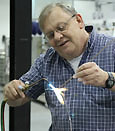
|
| Jerry Mannen |
The best way to avoid costly repairs is to perform regular preventive work, and, while most work is best left to the professionals, some things can be performed without the assistance of a service professional.
Here’s a short guide regarding what homeowners may be able to accomplish at home, and a contrasting list of what is best left up to the HVAC professionals.
Replacing an Air Filter: A furnace’s air filter works to keep dust and dirt off the components inside the furnace and out of your indoor air. A clogged filter can cause your heating and cooling equipment to overwork due to lack of airflow and could even cause components to freeze up and malfunction. Changing the filter according to the manufacturer’s recommendation is one of the simplest ways you can prolong the life and efficiency of a furnace. If a homeowner doesn’t feel comfortable changing the filter, or has difficulty keeping track of when the filter was last changed, perhaps it’s best to consult your local contractor.
Cleaning an Outdoor Unit: Outdoor air conditioning units tend to attract dirt, grass clippings, and other landscape debris. This type of debris can cut down on the efficiency of the unit or damage the fins of the air conditioner. Try to hose down the unit after a storm or after doing yard work to help keep it clean and running properly. But, a simple exterior wash won’t allow you to clean the mechanical system hidden inside. Schedule regular maintenance with a professional to ensure the system is running efficiently and correctly.
Setting a Thermostat: When you set your thermostat with the fan in the on position, the fan will run continually, taxing your system at times when it might not be needed. Alternatively, setting your fan to auto causes the fan to run only when the thermostat is calling for air conditioning or heating. However, it’s important to know which type of motor, compressor, or air handler your system encases, as some systems benefit when the thermostat fan is set to run constantly. Consult your local contractor for more details.
Installing a New System: Most residential and commercial HVAC installations require the services of an HVAC contractor who must obtain building permits and meet a variety of building codes. HVAC professionals also ensure that a system is designed to run at optimal performance and efficiency. While it may be tempting to save money by installing the system yourself, it may actually cost you more money in the long run if you install the system incorrectly.
Performing an Annual Tune-Up: An annual tune-up can improve the efficiency of an HVAC system and even delay the need for a full replacement. A trained HVAC technician uses specialty tools and can run diagnostic tests on the system to ensure proper functionality. Annual tune-ups are also important in maintaining the warranty, which likely requires a record of service to honor the warranty.
Advice from a Professional: The importance of leaving the annual tune-up to the professional is because, when utilizing test equipment, proper training is vital in assuring customers that an HVAC system is operating efficiently. The purpose of annual tune-ups is to maintain the integrity of the HVAC system and to help prevent unnecessary repairs in the future, and this can only be achieved by someone who has the experience and professional training of the complete HVAC system and not just conducting an annual wash and clean, as is safe for a novice to maintain.
Publication date: 8/5/2013
Want more HVAC industry news and information? Join The NEWS on Facebook, Twitter, and LinkedIn today!


Report Abusive Comment